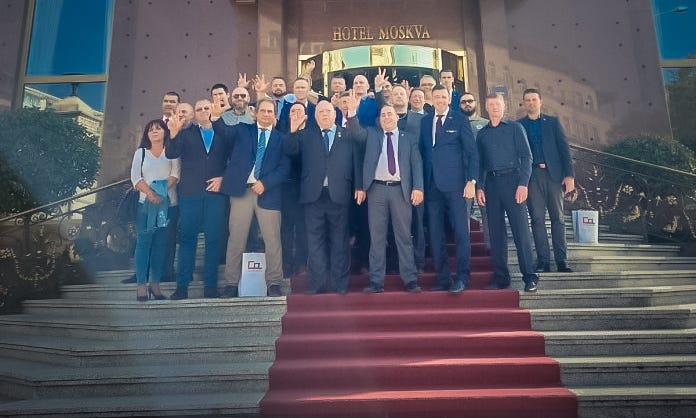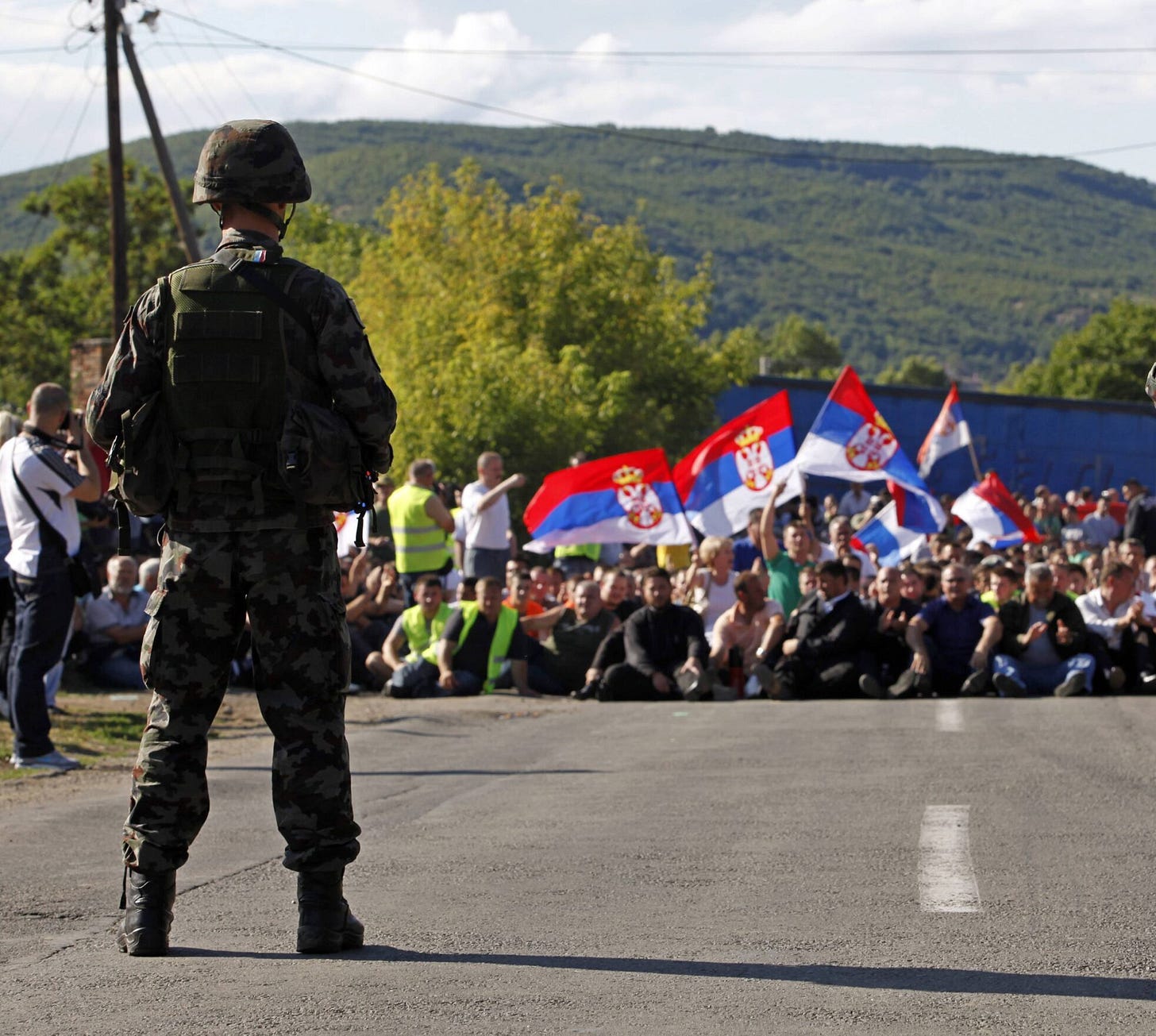S2E11. The dark souls of Europe
Neo-fascist groups from all over the continent gathered in Belgrade to attack the «sanitary tyranny» and to support Serbian ultra-nationalists against independent Kosovo
Hi,
welcome back to BarBalkans, the newsletter with blurred boundaries.
There is something rotten in Europe. And it is no surprise.
As the latest cases of revival of fascist movements demonstrated, the European democracies are in danger of underestimating problems that are contained, but unacceptable.
We experienced this risk with the violent assault on the Italian General Confederation of Labour’s headquarters in Rome on October 9. It was the consequence of the armed degeneration of the No Green Pass protests.
It was led by the leaders of the neofascist political party Forza Nuova. One above all, its national secretary, Roberto Fiore, who was arrested for the violence in Corso Italia 25.
Only a couple of weeks earlier, Fiore was also one of the protagonists of another disturbing episode, in the very heart of the Western Balkans.

The neo-fascist Congress
Europe’s black souls appeared all together for the last time on September 26, in Belgrade.
Neo-fascist groups from all over Europe gathered at the Moskva Hotel for the Alliance for Peace and Freedom (APF) Congress.
There were Roberto Fiore for Forza Nuova, Yvan Benedetti for the French Nationalist Party (born in the 2013 after the dissolution of Œuvre Française, outlawed for anti-Semitic and racist propaganda) and Yiannis Zografos for the Greek movement Elasyn, born after the dissolution of outlawed Golden Dawn.
From Spain, Manuel Andrino for the Spanish Falange (which claims to be a direct descendant of the 1930s fascist party), and Gonzalo Martín García for Democracia Nacional.
There was also a Russian delegation - including several war veterans - and Romanian Cristi Grigoraș for Noua Dreapta.
They were all guests of Misha Vacic, leader of the new Serbian ultra-nationalist right wing.
To be clear, the Alliance for Peace and Freedom is also home to the neo-nazi National Democratic Party of Germany.
Politically, they are all irrelevant groups, except for the People’s Party Our Slovakia, which had 17 deputies in the National Assembly and one MEP (Milan Uhrík), before its crisis in January 2021.
Another MEP was the Greek neo-nazi Ioannis Lagos, who was arrested and extradited after the European Parliament lifted his parliamentary immunity on April 27.
The first item on APF Congress agenda was the «need to give life throughout Europe to a movement of opposition against the diktats of the sanitary tyranny that in Italy and France try to destroy the dignity and health of peoples».
And now we can understand the connection with the violence in Rome and the assault on the national headquarters of the CGIL.
But there is more.

The merry band of neo-fascists, neo-nazis, ultra-nationalists - call them what you will - was captured in Belgrade while saluting “Serbian style”, with three fingers (thumb-index-middle) raised and the others closed.
This is a religious salute used first by the cethniks during the Yugoslav Wars, then by the right-wing hooligans.
There is a reason for this salute.
Neo-fascist movements from all over Europe reiterated their opposition to the independence of Kosovo, alongside Serbian nationalism:
«We are in favor of a Serbian Kosovo no longer subservient to international powers and not occupied by the armies of the European community».
The “Serbian three-finger salute” is synonymous with ethnic supremacy. Or, as you can read on Serbian hooligans’ T-shirts, with the crystal clear “we take no prisoners”.
Especially in Kosovo.
Just what we need, fascists
There was really no need for extremists to fan the flames of tensions between Belgrade and Pristina.
For a month now, relations between the two countries have reached one of their lowest points in recent years, in a decline in affinity since the day Kosovar Prime Minister Albin Kurti took office (BarBalkans reported on it in February).
It all started six days before the Congress in Belgrade (and it is no coincidence that European neo-fascists reiterated their support for Serbian Kosovo).
On September 20, a crisis broke out on the northern border of Kosovo: the so-called war of the license plates.
The casus belli was the decision of the government in Pristina to impose the change of license plates on Serbian vehicles entering Kosovo territory. Special police units rushed to the border crossing points and stopped cars and trucks.
The Serb minority in Kosovo, concentrated in the north of the country, blocked roads and the most violent factions clashed with the police.
As the two national governments intervened, tensions grew exponentially.
For the Serbian president, Aleksandar Vučić, this was a direct attack against the Serbian minority and an attempt to destabilize the region. For this reason, he put on high alert some military contingents.
On the opposite, Kosovo Prime Minister Kurti declared that the decision was based on the principle of reciprocity. For some time now, citizens of Kosovo have been obliged to cover their license plates with a temporary one given by the Serbian authorities, when crossing the border.
Brussels had to intervene, in order not to blow up the decade-long dialogue - mediated by the European Union - for the normalization of relations between Pristina and Belgrade.
Tensions escalated for the entire duration of the EU Commission President Ursula von der Leyen’s visit to the six Western Balkan capitals.
But in the very last hours of her stay, the negotiators were able to reach an agreement.
Roadblocks and police stations have been removed and, since October 21, a group of experts has been working in Brussels to find a final solution.
There was not even time to celebrate the «success» at the EU-Western Balkans Summit (you can find out more here), and tensions flared up again in northern Kosovo.
On October 13, anti-smuggling operations, carried out in Mitrovica (but also in Peć and Pristina), caused a new wave of violent protests by the local population.
Resistance in the northern town of Kosovo provoked the reaction of special Kosovar police, with tear gas and deafening bombs. In the clashes, six officers and about ten protesters were injured.
Political controversy was immediately triggered. The government in Belgrade said it was ready to support Serbs of Kosovo in case of raising violence, but it also tried not to stir things up too much.
On the other hand, the government in Pristina accused some Serbian media - «which support criminality, corruption and smuggling» - of misleading the population by politicizing the whole affair.
After a few days, the tension de-eascalated. However, while the relations between Pristina and Belgrade are very cold, northern Kosovo seems likely to explode at any moment.
Well, if we let neo-fascists do whatever they want in all this powder keg - which is based on a very delicate balance - we can say goodbye to reconciliation in the region and to a peaceful future.
These are the first principles of civilized life that right-wing extremists and ultra-nationalists would like to demolish.
In the Balkans, in Europe and everywhere else in the world.
Pit stop. Sittin’ at the BarBalkans
We have reached the end of this piece of road.
Today there is nothing on the counter of our bar.
Because we don’t even share a beer with fascists.
Here there is no place for people who preach violence, hatred, intolerance, racism and supremacy.
That’s it.
BarBalkans will always be a garrison of openness, contamination, brotherhood, legality and anti-fascism.
This is why today - as every day - we put our glasses to the sky and lift up, singing the most beautiful hymn of freedom. As the great Bosnian composer, Goran Bregović, teaches us:
Let’s continue the BarBalkans journey. We will meet again in a week, for the 12th stop.
A big hug and have a good journey!
BarBalkans is a free weekly newsletter. Behind these contents there is a lot of work undertaken.
If you want to help this project to improve, I kindly ask you to consider the possibility of donating. As a gift, every second Wednesday of the month you will receive a podcast with an article about the dissolution of Yugoslavia.
Every month you can listen to the preview of BarBalkans - Podcast on Spreaker and Spotify.
Pay attention! The first time you will receive the newsletter, it may go to spam, or to “Promotions Tab”, if you use Gmail. Just move it to “Inbox” and, on the top of the e-mail, flag the specific option to receive the next ones there.
As always, I thank you for getting this far with me. Here you can find all the previous newsletters.
BarBalkans is on Facebook, Twitter and Instagram. The updated archive is on Linktree.






